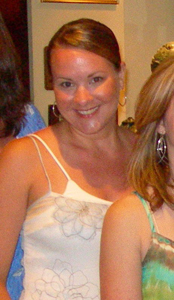“My Voice” by Donna Zurick

Donna Zurick - 'Survivor'
My story officially began on January 20, 2005- I was diagnosed with Thyroid Cancer. However, symptoms had been creeping up on me for the past few years. I was lucky, my doctor said, and soon I would realize it was a common practice to tell Thyroid Cancer patients that we had the “best cancer there is.” As if getting cancer was something on my bucket list.
I was lucky, however, due much in part to my consistent pressure on my primary care physician about random symptoms I was feeling. Symptoms that could have been seen as depression, skipping vitamins, lack of sleep, stress, or just plain getting older. Luckily for me, she was a great primary care physician.
My cancer was caught early. I went through treatment without any major complications, give or take a little “hypo hell,” and light-heartedly telling people I got the scar on my neck in a bar fight. (Nothing comes between me and my Sierra Nevada!)
My treatment consisted of a near total thyroidectomy, treatment with radioactive iodine, and months and months of trying to adjust my Synthroid dose.
Here I am 5 years later. A proud Survivor. Life after treatment, as a Survivor, has been a journey of ups and downs. Here’s what I’ve learned…
It’s so important to listen to your body. Listening to my body, and telling my doctor over and over how I felt enabled me to get an early diagnosis. To this day, I firmly believe that I am the only one living in my body, and therefore the only one who knows for sure what feels “normal.” And when it doesn’t, believe me, I’ll speak up!
No one tells you how to be a survivor. I pushed through treatment; everyone is there to give you support, and suddenly things change the day you are done. It’s a tough transition.
Everyone expects that when treatment is over, you’re as good as new. I know for me that wasn’t really the case, and it takes time to figure out how to deal with “feeling “normal.” Then again, I’m not sure what “normal” is anymore. But no matter what, I’m still me- normal, abnormal, or somewhere in between.
Support is undeniably important. It’s tough to describe what you’re going through to people. And sometimes when you talk about cancer, it makes those close to you uncomfortable. I still go to support group meetings and communicate with other survivors on a regular basis. It’s important to me to stay connected with these people, because I know they will always listen, they’ll always have some good advice, and/or they will put things in perspective for me. There is a great network of survivors out there, especially young adults. They are now a part of my family. I’m so glad I’ve gotten to know many of them, as they are a valuable part of my day to day life, and I am better off knowing them.
Sometimes being a survivor sucks. I’m reminded all too often that we’re all still human, and so much needs to be done to improve our chances against cancer. One of the hardest parts of being a member of the cancer survivor community comes with the loss of a fellow survivor. It never gets any easier, but it makes me want to fight harder and do all that I can to raise awareness, promote wellness, and demand commitment to fighting this disease.
Every day is a blessing. I find that I no longer get wrapped up in all the small, trivial things that so often people do. I enjoy the little things so much more- from a beautiful sunset, to a fun weekend with family, to a nice cold beer with friends. I also remind myself that we don’t all need to be Lance Armstrong or Mother Theresa to change the world and inspire others. Every little thing counts.
Feel everything. Pain and sadness are a part of life. And in living life to the fullest, you encounter both. It’s difficult to remind yourself of this, but it does help the bad days seem a little less daunting.
Remember what’s important. I don’t have a bucket list. I do have a list in my heart of people and things that are important to me. I try to remember to tell my mom I love her, smile at someone who’s having a bad day, take a long walk along the Harbor to smell the fresh air, and just live each day so that I can look back at night and think how wonderful it was.
As a survivor, I’m sure my learning is not over. There is no doubt I still have many lessons to be learned. I’m sure they all won’t be easy. But I’m glad I’ve got a great network of friends and family to help me through it. And I hope that perhaps my experience will help someone else through their own.


